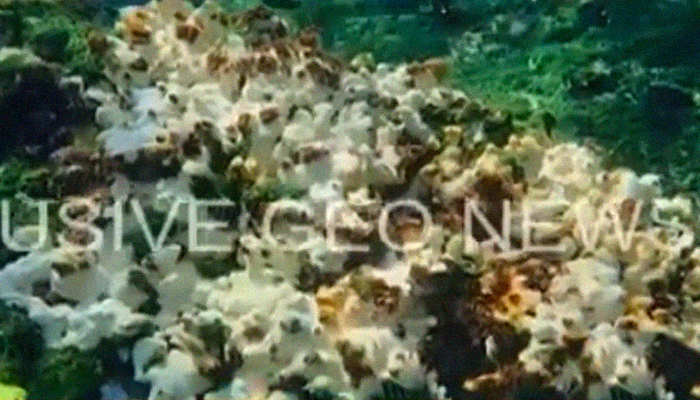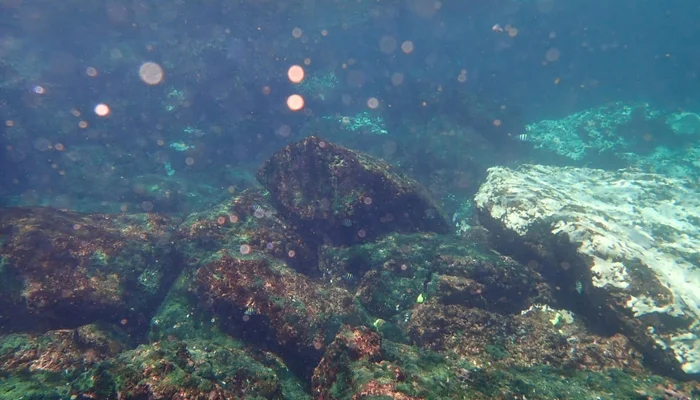Climate emergency: Karachiites urged to act as coral bleaching threatens marine life
Climate change, rising sea temperatures, and industrial activity have caused irreparable damage to submarine life near Karachi
November 29, 2020

KARACHI: Citizens of the port city have been urged by an expert diver to take responsibility for the environment as coral bleaching — reported for the first time out of Pakistan last month — threatens marine life and poses a risk of exacerbating the climate emergency.
Khizar Sharif, a scuba diver certified by the Professional Association of Diving Instructors (PADI), alerted activists and authorities of coral bleaching for the first time in October 2020 when he came upon the pale, whitened, and dying coral reefs near Churna Island.
"The coral reefs turning white shows that they are bleaching, which means that they are dying. And anything dying is never a good sign," Sharif told Geo News, with which he had also exclusively shared the footage he filmed underwater.
Pakistan, at present, ranks fifth among the countries most affected by climate emergency, with climate change, rising sea temperatures, and industrial activity causing irreparable damage to submarine life near Karachi and its surroundings.
Speaking to Geo News during an interview, the expert diver said he has been observing coral reefs since quite a few years and that many small fishes and various other species live there.
Read more: WWF-Pakistan warns fragile corals face threat of bleaching in Pakistan
Coral reefs are usually brightly-coloured and provide not only home to but sustenance for aquatic life. In fact, according to experts, more animals live in coral reefs than in the jungles of Latin America, Asia, and Africa.
Coral bleaching was been reported for the first time earlier this month near Pakistan's Churna Island, according to a statement issued by the WWF-Pakistan, which cited Sharif's venture under the water in the last weeks of October.

In some areas, large patches of bleaching were observed whereas it was limited in other parts, the WWF-Pakistan said, warning that it was a "grave threat" to the coastal biodiversity in the country.
"When I dove under the surface back on October 10, it was skin-diving — a mix of snorkeling and freediving and breath-hold dives — and without proper diving gear, but I often have my underwater camera with me," Sharif said.
Related: How many corals are in Pakistan and how does bleaching take place?
"I was shocked at first to see the bleached-up, white coral reefs but then I observed them closely, using my camera to snap some shots."
The diver subsequently shared the footage and images to highlight the serious environmental issue and urge people to take action.
When asked what does he find most under the water, apart from the thriving marine life, he said the most common items were discarded beverage cans and bottles, plastic plates and glasses, as well as wrappers.
"We don't realise that the garbage we throw around the city ends up in the ocean. We now urgently need to fulfill our responsibility in this regard," he stated.
Sharif advised everyone not to delay action by depending on the government or others.
Also read: If Pakistan doesn't act now it could lose these 10 animals forever
"We should not be looking towards the governments or other people to do something about it... to fix this situation. We need to take such initiatives by ourselves that improve our environment," he underscored.
According to another report shared by the wildlife conservation NGO, WWF-Pakistan’s Sindh and Balochistan regional head Dr Tahir Rasheed explained that negative environmental conditions and microbial diseases caused the coral bleaching.
“In such conditions, corals expel the zooxanthellae living in their tissues causing the coral to turn completely white. This process is called coral bleaching and leads to the death of corals,” he told Dawn.
Calls to declare Churna Island MPA
Experts, including Dr Rasheed and WWF-Pakistan's technical adviser on marine fisheries, Mohammad Moazzam Khan, have called upon the government to declare Churna Island a 'Marine Protected Area (MPA)'.
Khan said bleaching could also be occurring due to industrial activities and development projects turning up the seawater temperature. Such activities "will not only negatively impact the corals but may wipe out most of the rich biodiversity from the area", he warned.
WWF-Pakistan frequently shares updates on Pakistan's wildlife, as well as the marine life.
In a recent update, it shared that a large pod of pantropical dolphins — comprising nearly 50 of the fish — was spotted near Churna Island.











